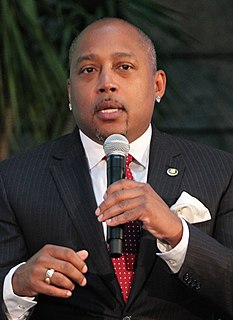A Quote by Mary Pilon
Individual participation in the stock market through 401(k)s helped fuel the go-go days of Wall Street in the 1980s and birthed asset management juggernauts like Fidelity, Vanguard, Pimco, BlackRock, and dozens of others.
Related Quotes
The underlying strategy of the Fed is to tell people, "Do you want your money to lose value in the bank, or do you want to put it in the stock market?" They're trying to push money into the stock market, into hedge funds, to temporarily bid up prices. Then, all of a sudden, the Fed can raise interest rates, let the stock market prices collapse and the people will lose even more in the stock market than they would have by the negative interest rates in the bank. So it's a pro-Wall Street financial engineering gimmick.
If the stock market does go through a crisis of confidence, which I think clearly will happen one of these days, no one can predict just like you couldn't the dot com crash or the Lehman crash, but when it goes down it will go down by thousands of points because everyone will panic. No one owns this market today because they believe there's a huge sunny future for the United States economy. They're buying because they think the Fed can keep the thing pumped up, the bubble expanding.
Managing the other fellow's business is a fascinating game. Trade unionists all over the country have pronounced ideas for the reform of Wall Street banks; and Wall Street bankers are not far behind in giving plans for the tremendous improvement of trade union policies. Wholesalers have schemes for improving the retailer; the retailer knows just what is wrong in the conduct of wholesale business-and we might go through a long list.... Yet for some reason the classes that ought to be helped keep on stubbornly clinging to their own method of running their affairs.
Speculators are obsessed with predicting: guessing the direction of stock prices. Every morning on cable television, every afternoon on the stock market report, every weekend in Barron's, every week in dozens of market newsletters, and whenever business people get together. In reality, no one knows what the market will do; trying to predict it is a waste of time, and investing based upon that prediction is a purely speculative undertaking.
Successful investors like stocks better when they’re going down. When you go to a department store or a supermarket, you like to buy merchandise on sale, but it doesn’t work that way in the stock market. In the stock market, people panic when stocks are going down, so they like them less when they should like them more. When prices go down, you shouldn’t panic, but it’s hard to control your emotions when you’re overextended, when you see your net worth drop in half and you worry that you won’t have enough money to pay for your kids’ college.
Logic is the subject that has helped me most in picking stocks, if only because it taught me to identify the peculiar illogic of Wall Street. Actually Wall Street thinks just as the Greeks did. The early Greeks used to sit around for days and debate how many teeth a horse has. They thought they could figure it out just by sitting there, instead of checking the horse. A lot of investors sit around and debate whether a stock is going up, as if the financial muse will give them the answer, instead of checking the company.
































